Featured
 DEI: The Case for Common Ground. By James E. Ryan / The Chronicle of Higher Education
DEI: The Case for Common Ground. By James E. Ryan / The Chronicle of Higher Education
James E. Ryan is president of the University of Virginia.
Efforts to promote diversity, equity, and inclusion on college campuses are increasingly under fire. DEI programs and offices, which have been around for decades, are now the targets of a steady stream of criticism, and legislation has been introduced in at least 20 states to limit DEI programs at public universities. Despite this swirl, I believe there is more room for common ground than might appear from news accounts.
Critics of DEI fall roughly into two camps. One embraces the basic principles that college campuses are better places if they are diverse, treat people fairly, and are welcoming to all. But the critics are concerned about overreach, especially where DEI efforts threaten academic freedom or seem designed to enforce ideological conformity. Another camp would like to see DEI disappear altogether. Those critics assert that the programs are being used to promote a stringently liberal, if not radical, agenda — one that stands in opposition to merit and excellence and unfairly privileges certain groups over others.
I disagree with those who would like to prohibit DEI efforts altogether. Read more
Political / Social
 The ambitious Republican plot to take it all down. By Heather Digby Parton / Salon
The ambitious Republican plot to take it all down. By Heather Digby Parton / Salon
Republicans have come to believe that the entire federal government is filled with woke liberals
Picture it, if you will, it’s January 21, 2025 and Donald Trump has just been inaugurated for his second term after the Biden interregnum. Yes, it would be a horrific time, not unlike those first horrible weeks in 2017 when over half the country struggled to grasp how it was possible that an ignorant, bombastic, game show host had eked out a win through an electoral college fluke. But those feelings of despair are where the similarities will end. The next Trump administration will be ready to hit the ground running with their leader’s Retribution Agenda and it won’t be because Trump is any more effective at presidential leadership. It will be because right-wing institutions will have spent their four years in the wilderness preparing for their chance to enact a radical overhaul of the federal government unlike anything we’ve ever seen in this country. Read more
Related: Violence is the new Republican grift. By Chauncey Devega / Salon
Related: The Real Threat to Freedom Is Coming From the States. By Jamelle Bouie / NYT
Related: Trump still has the MAGA touch: Republican women remain captivated. By Chauncey Devega / Salon
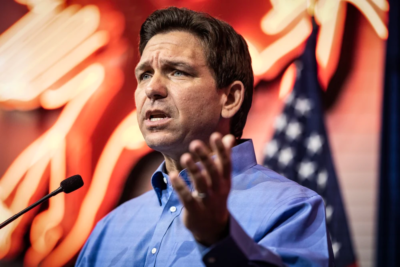 Ron DeSantis is learning that not every state wants to be Florida. By Henry J. Gomez / NBC News
Ron DeSantis is learning that not every state wants to be Florida. By Henry J. Gomez / NBC News
Wherever Gov. Ron DeSantis goes, he brings greetings from “the free state of Florida.” He heralds his “Florida Blueprint.” And he brags about how many people originally from whichever state he happens to be visiting love taking advantage of Florida’s warm weather and low taxes.
But a funny thing has happened as DeSantis travels the country with a “Make America Florida” message that underpins the Republican’s soon-to-launch presidential campaign. DeSantis has found that not everyone wants to be Florida. And he has encountered spirited pushback from competitive fellow governors and GOP officials who believe that their states have done just as much, if not more, to advance a conservative agenda. Read more
Related: Ron DeSantis upended education in Florida. He’s coming for your state next. By Bianca Quilantan / Politico
Related: Ron DeSantis Faces Three New Lawsuits After Signing New Voter Suppression Bill. By Ari Berman / Mother Jones
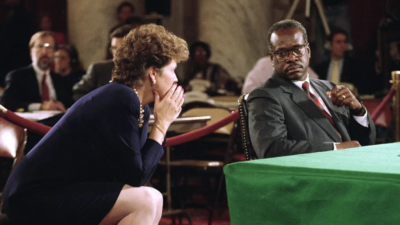 FRONTLINE Presents “Clarence and Ginni Thomas: Politics, Power and the Supreme Court.” By PBS.
FRONTLINE Presents “Clarence and Ginni Thomas: Politics, Power and the Supreme Court.” By PBS.
A major two-hour investigative documentary special on the Thomases’ lives and controversial rise to power and influence
Over the past three decades, Supreme Court Justice Clarence Thomas has risen to the center of power in Washington, impacting issues affecting millions of Americans — from abortion to affirmative action. By his side has been his wife and best friend, Ginni Thomas. Together, the Thomases have left an indelible mark on America — in the legal realm and in conservative politics. But what has fueled their rise and expanding influence, and what have been the consequences? Read more
 Tim Scott, the GOP, and Black Voters. By Brandon Tensley / Capital B
Tim Scott, the GOP, and Black Voters. By Brandon Tensley / Capital B
“The GOP brand in Black America is really damaged,” one observer says.
Republican U.S. Sen. Tim Scott would need to radically soften his party’s image to meaningfully grow his support among Black voters, political observers say. Yet that doesn’t seem too likely, given that during the South Carolina senator’s official announcement of his White House bid on Monday, he didn’t do much to quiet the concerns Black voters have about the GOP and its disregard for issues that matter to them. Most Black adults believe that “racism is an extremely big problem” and that “racial discrimination is the main reason why many Black people can’t get ahead these days,” according to the Pew Research Center. During his speech, however, Scott downplayed the persistence of racial inequality, and leaned into his party’s attacks on critical race theory. He also mentioned that his family went “from cotton to Congress in one lifetime” — his go-to rejoinder to the structural critiques of U.S. society Black voters embrace. Read more
 Is America Two Nations? By Mike Podhorzer and Felicia Wong / The New Republic Podcast
Is America Two Nations? By Mike Podhorzer and Felicia Wong / The New Republic Podcast
Division—racial, cultural, economic, and electoral—has dominated our politics from the very beginning.
It’s not uncommon for political pundits to muse on the differences between red and blue America. But political analyst Michael Podhorzer argues that the United States has always been more like two nations tenuously united under the Constitution. On this episode of How to Save a Country, co-hosts Michael Tomasky and Felicia Wong discuss with Mike the historical origins of this split, the ramifications for electoral strategy, and the role the Supreme Court has played in hardening these divisions. Read more
 Harris becomes first woman to deliver commencement address at West Point. By Jasmine Wright / CNN
Harris becomes first woman to deliver commencement address at West Point. By Jasmine Wright / CNN
Vice President Kamala Harris on Saturday became the first woman to deliver a commencement address at the graduation ceremony at the US Military Academy in West Point, New York, warning graduates they were “an increasingly unsettled world where long standing principles are at risk.”
In the history-making speech, Harris discussed themes of global security and prosperity, arguing that America’s democratic ideals “inspire billions.” “In the face of all these challenges, America plays a singular role of leadership,” the vice president told the graduates. “Cadets, global security and global prosperity depend on the leadership of the United States of America. And a strong America remains indispensable to the world.” Read more
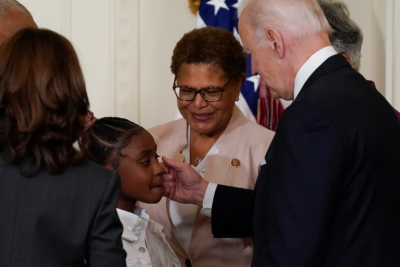 Three years after Floyd’s death, a reckoning for Biden’s agenda on race. By Toluse Olorunnipa, Scott Clement and Emily Guskin / Wash Post
Three years after Floyd’s death, a reckoning for Biden’s agenda on race. By Toluse Olorunnipa, Scott Clement and Emily Guskin / Wash Post
Amid slow pace of police reform, many Black voters do not feel that Biden has improved their lives
Three years after the murder of George Floyd sparked global protests and led then-candidate Joe Biden to endorse a broad platform of racial justice initiatives, the president is under pressure to prove to Black voters that he enacted as much of his equity agenda as possible — and that he remains committed to delivering for his most loyal supporters in a second term. Read more
Related: The Toll of Police Violence on Black People’s Mental Health. / NYT
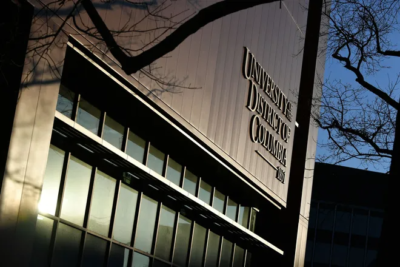 Why philanthropic funding strongly favors white colleges over HBCUs. By Marc Ramirez / USA Today
Why philanthropic funding strongly favors white colleges over HBCUs. By Marc Ramirez / USA Today
Changes are necessary on both sides of the table to address the chronic lack of funding faced by historically Black colleges and universities, some experts say in the wake of a report showing the vast funding disparity between Historically Black Colleges and Universities and their Ivy League counterparts.
While the largest challenge remains the redirecting of philanthropic funds to HBCUs, they say, HBCU leaders also need to be better about promoting their product through tools such as social media and podcasts – even if financial challenges make those tasks more difficult. The recently released study, conducted by philanthropic research group Candid in partnership with ABFE, a nonprofit pushing for investment in Black communities, found funding to HBCUs from large U.S. foundations fell 30% between 2002 to 2019, with the average Ivy League institution receiving 178 times more foundation funding than the average HBCU. Read more
Ethics / Morality / Religion
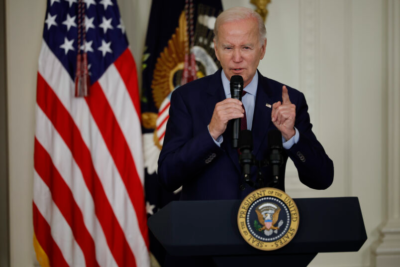 WH Plan To Combat Antisemitism Takes On Centuries Of Hatred, Discrimination And Lynching In America. By Pamela S. Nadell / TPM
WH Plan To Combat Antisemitism Takes On Centuries Of Hatred, Discrimination And Lynching In America. By Pamela S. Nadell / TPM
The antisemitism the White House hopes to combat today rests on the history of the lynching of Leo Frank and much more.
The U.S. National Strategy to Counter Antisemitism, released on May 25, 2023, was based on conversations with more than a thousand stakeholders, including me, a scholar of American Jewish history. The plan outlines over 100 steps for federal agencies to take in the coming year and calls upon Congress, state and local governments and the private sector to join them. Understanding that history matters, those steps include raising awareness of antisemitism in the present and the past, and expanding knowledge of Jewish heritage in the U.S. Read more
Related: Jewish organizations laud White House plan to fight antisemitism. By Yonat Shimron / RNS
 How AI could be misused to persecute religious minorities worldwide. By David Curry / RNS
How AI could be misused to persecute religious minorities worldwide. By David Curry / RNS
Artificial intelligence is quickly becoming an everyday part of our lives. Digital assistants have long helped us order products online and answer questions. Social media platforms use AI to serve up photos and videos tailored to our interests. Office workers have adopted chat bots to help write emails; teachers are on the lookout for students using them to write essays.
In the wrong hands, AI could spell trouble for persecuted Christians and religious minorities around the world. Oppressive governments, terrorist groups and other nefarious actors are already abusing and misusing digital technology for their evil ends. Adding the abilities of AI could worsen the lives of Christians and other vulnerable communities. Read more
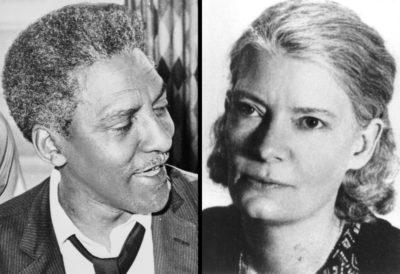 ‘War by Other Means’ highlights 4 pacifists who resisted World War II. By Allyson Winter-Polman / NCR
‘War by Other Means’ highlights 4 pacifists who resisted World War II. By Allyson Winter-Polman / NCR
Bayard Rustin, left, is pictured in 1964; Dorothy Day is seen in a 1935 file photo. (Library of Congress/World Telegram & Sun photo/Ed Ford; CNS/Courtesy of Marquette University Archives)
In this unique work, Akst tells the compelling tale of the few Americans who remained pacifists through the duration of World War II. He features big names like Dorothy Day, Bayard Rustin, David Dellinger and Dwight Macdonald, but readers learn the stories of many inspiring others along the way, whose shared traits, according to Akst, are “asceticism, strength of soul, a concern with moral purity, and a great tenderness toward one’s fellow humans.” These characteristics, in combination with Akst’s account, present a motley crew of endearing activists whose stories reflect a pure idealism put into practical action. Read more
 O for a Thousand Tongues of Fire. By Hannah King / Christianity Today
O for a Thousand Tongues of Fire. By Hannah King / Christianity Today
The modern church in the West has a suspicious relationship with power. When it serves our interests or protects our privilege, we justify evil in many forms—from denying racism to protecting sexual predators.
The problem is not new, nor is it distinctly Western, but modern projects like investigative journalism and social media have increasingly exposed it as our problem nonetheless. No denomination is blameless. No theological tribe or form of church governance is immune to corruption. Our track record of protecting the powerful makes us look like any other institution. Along with hurting our witness in the world, the church’s perverse relationship with power has created a crisis among believers. In recent years, young Christians in particular have felt betrayed and disillusioned by their leaders’ loyalties to the status quo. Read more
Historical / Cultural
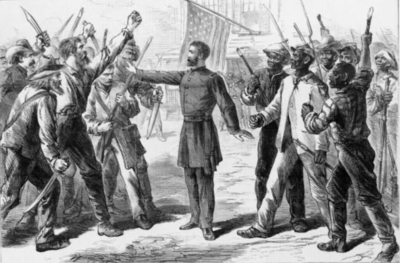 Social Welfare and the Politics of Race in the Post-Civil War South. By Ryan W. Keating / AAIHS
Social Welfare and the Politics of Race in the Post-Civil War South. By Ryan W. Keating / AAIHS
The Freedmen’s Bureau drawn by A.R. Waud, 1868 (Library of Congress)
In the wake of the Civil War, the federal government sought to support freed people by establishing social welfare programs such as the Freedmen’s Bureau. Southern whites rejected these efforts in rhetoric, linking race and welfare that defines political discourse to this day. “The same sun is still there, the same mighty country is there: yes, and the same negro is there to work that once was,” editors of Louisville’s The Courier Journal lamented on June 14 1868. Read more
Rachel Maddow’s podcast tells the story of American Nazis in the 1940s. But the era’s real and lasting authoritarian danger came from the spectacular growth of a national security state. Shown is Father Charles Coughlin delivers a radio speech (Fotosearch/Getty Images).
Maddow, with cowriters and producers Mike Yarvitz and Kelsey Desiderio, tells the story of a fascist plot designed to keep the United States out of the Second World War and in the process subvert American democracy by exploiting what the Germans called “kernels of disturbance”—racial, cultural, and political differences that lead to “national demoralization.” If this resembles our own time, that is the point. Maddow analogizes Trump and his contemporary circle of supporters, inside and outside of Congress, to the Nazi agents of 1940 and their American collaborators, some of whom were indeed sitting congressmen and senators. Read more
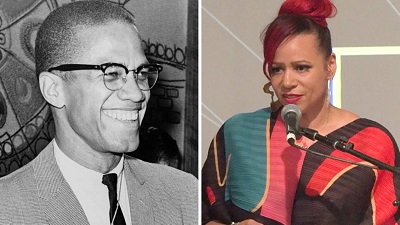 “Education Leads to Liberation”: Nikole Hannah-Jones on The 1619 Project & Teaching Black History. Amy Goodman / Democracy Now
“Education Leads to Liberation”: Nikole Hannah-Jones on The 1619 Project & Teaching Black History. Amy Goodman / Democracy Now
As attacks on the teaching of Black history escalate in Florida and other states, we hear from The New York Times journalist Nikole Hannah-Jones, who won a Pulitzer Prize for her work on “The 1619 Project.” She spoke on May 19 at the Malcolm X and Dr. Betty Shabazz Memorial and Educational Center, which is housed in the former Audubon Ballroom in New York where Malcolm X was assassinated in 1965, and talked about the impact Malcolm X’s writing had on her life, as well as the importance of teaching the full history of the United States. “What we commonly call history is actually memory, and that memory in the United States has been shaped too often by white men in power who want us to remember the history of a country that never existed,” she said. Read more and listen here
 America’s strength is learning through history — not rewriting it. By Ken Chenault and Ken Frazier / Wash Post
America’s strength is learning through history — not rewriting it. By Ken Chenault and Ken Frazier / Wash Post
Ken Chenault is former chairman and CEO of American Express, and current chairman and managing director of venture capital firm General Catalyst. Ken Frazier is former president, CEO and executive chairman of the board of directors of Merck, and current chairman of health assurance initiatives at General Catalyst.
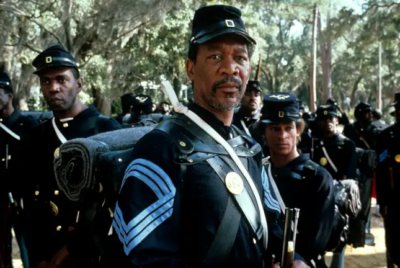 Black Military Movies You Should Watch This Memorial Day. By Noah A. McGee / The Root
Black Military Movies You Should Watch This Memorial Day. By Noah A. McGee / The Root
Films such as Glory, Men of Honor and Da 5 Bloods are excellent movies about Black military life.
Let’s face it, we all use Memorial Day weekend to chill…and traditionally to chill and BBQ with family. Low key though, the day is really suppose to be about honoring and remembering the people in the military who have served our country. But why not do both? You can enjoy Auntie’s mac and cheese and Uncle Charle’s burgers while watching some great Black military movies. Here are some of The Root’s favorites. Read more
 Tina Turner, Magnetic Singer of Explosive Power, Is Dead at 83. By William Grimes / NYT
Tina Turner, Magnetic Singer of Explosive Power, Is Dead at 83. By William Grimes / NYT
Tina Turner in concert in Los Angeles in 1984. Her album “Private Dancer,” released that year, returned her to the spotlight after a long absence and lifted her into the pop stratosphere.Credit…Phil Ramey/Associated Press
Ms. Turner embarked on her half-century career in the late 1950s, while still attending high school, when she began singing with Ike Turner and his band, the Kings of Rhythm. At first she was only an occasional performer, but she soon became the group’s star attraction — and Mr. Turner’s wife. With her potent, bluesy voice and her frenetic dancing style, she made an instant impression. Their ensemble, soon renamed the Ike and Tina Turner Revue, became one of the premier touring soul acts in Black venues on the so-called chitlin’ circuit. After the Rolling Stones invited the group to open for them, first on a British tour in 1966 and then on an American tour in 1969, white listeners in both countries began paying attention. Read more
Related: Raw talent and a refusal to accept barriers made Tina Turner great. By Maureen Mahon / The Guardian
Related: Tina Turner renounced US citizenship, moved to Switzerland: Here’s why. By Morgan Hines / USA Today
 Why We Can Imagine Singing Fish, But Not Black Mermaids. By Arianna Coghill and Sam Van Pykeren / Mother Jones
Why We Can Imagine Singing Fish, But Not Black Mermaids. By Arianna Coghill and Sam Van Pykeren / Mother Jones
When Disney announced that the singer and actress Halle Bailey was chosen to play Ariel in the upcoming live-action adaptation of The Little Mermaid, I was uncharacteristically ecstatic. With her angelic voice and magnetic onscreen presence, even I, as a vocal Disney live-action hater, had to admit that Bailey as Ariel was a match made in heaven. As one half of the four-time Grammy-nominated duo, Chloe x Halle, she seemed the perfect choice to play a character whose voice is paramount to the story. Plus, as a Black woman, I was thrilled that young Black girls will have one more Disney princess to dream about. But not everyone shared my sentiments. Read more
Related: Before ‘The Little Mermaid,’ Black mermaids were part of mythology. By
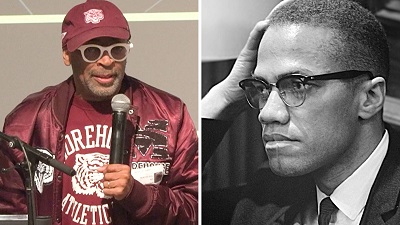 Spike Lee on “Malcolm X” & How Hollywood Almost Prevented Landmark Film from Being Made. By Amy Goodman / Democracy Now
Spike Lee on “Malcolm X” & How Hollywood Almost Prevented Landmark Film from Being Made. By Amy Goodman / Democracy Now
May 19 marked what would have been the 98th birthday of Malcolm X. The director Spike Lee gave the keynote address at an event marking the day at the Malcolm X and Dr. Betty Shabazz Memorial and Educational Center, which is housed in the former Audubon Ballroom in New York where Malcolm X was assassinated in 1965. Lee discussed the challenges of making his acclaimed 1992 biopic of Malcolm starring Denzel Washington, and how he overcame funding shortfalls and studio indifference to get the film made. “We knew that we had to keep going,” Lee said. Read more and Listen here
Sports
 Jim Brown Should Be Seen Fully, Flaws and All. By Kurt Streeter / NYT
Jim Brown Should Be Seen Fully, Flaws and All. By Kurt Streeter / NYT
Jim Brown, seated third from left, invited Bill Russell, Muhammad Ali, Kareem Abdul-Jabbar (then known as Lew Alcindor) and other leading Black athletes to support Ali in 1967.Credit…Tony Tomsic/Associated Press
For all his athletic prowess, all the heft he brought to his social activism, Jim Brown’s power sprang from his unyielding resistance to the narrow definitions imposed by American society on its Black citizens and, in his case, Black male athletes. The resounding power of no. That is what Jim Brown embodied. Brown, who died Thursday at 87, lived a life that became an ode to self-determination in the face of stinging racism. Read more
 NFL world reacts to Colin Kaepernick announcement. By Kevin Harrish / MSN
NFL world reacts to Colin Kaepernick announcement. By Kevin Harrish / MSN
Several years ago, former San Francisco 49ers star quarterback Colin Kaepernick caused quite a stir across the nation when he began kneeling during the national anthem before games in protest of racial inequality and injustice in the United States and in the NFL. But unfortunately, he does not seem to think a lot has changed since then.
During an interview with NPR this week, Colin Kaepernick was asked if he thinks that the NFL has changed for the better since his protests. And Kaepernick got brutally honest with his response, announcing to the world that he has not seen “substantial change” from the league. Read more
 College athletes mobilized after George Floyd. Three years later, those groups have evolved. By Glynn A. Hill / Wash Post
College athletes mobilized after George Floyd. Three years later, those groups have evolved. By Glynn A. Hill / Wash Post
Students attended the Black Student-Athlete Summit this week in Los Angeles. The event helps guide student-athlete activist groups at universities across the country. (Alisha Jucevic for The Washington Post)
In the weeks after Floyd’s killing, college athletes joined the swaths of people pushing for justice and equality. Many marched and mobilized, and some created campus and even nationwide coalitions with ambitions of inspiring change. With newfound support from the school administration, Vanderbilt’s group launched shortly thereafter, infusing its hopes of establishing a community with a commitment to social justice and expanded voting access among its core pillars. Read more
Site Information
Articles appearing in the Digest are archived on our home page. And at the top of this page register your email to receive notification of new editions of Race Inquiry Digest.
Click here for earlier Digests. The site is searchable by name or topic. See “search” at the top of this page.
About Race Inquiry and Race Inquiry Digest. The Digest is published on Mondays and Thursdays.
Use the customized buttons below to share the Digest in an email, or post to your Facebook, Linkedin or Twitter accounts.
 Ultra Violence. By Nelson Lichtenstein / Dissent
Ultra Violence. By Nelson Lichtenstein / Dissent